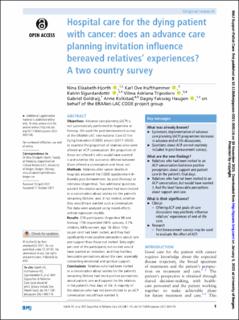| dc.contributor.author | Hjorth, Nina Elisabeth | |
| dc.contributor.author | Hufthammer, Karl Ove | |
| dc.contributor.author | Sigurdardottir, Katrin Rut | |
| dc.contributor.author | Tripodoro, Vilma Adriana | |
| dc.contributor.author | Goldraij, Gabriel | |
| dc.contributor.author | Kvikstad, Anne | |
| dc.contributor.author | Haugen, Dagny Renata Faksvåg | |
| dc.date.accessioned | 2022-02-10T13:35:05Z | |
| dc.date.available | 2022-02-10T13:35:05Z | |
| dc.date.created | 2021-12-15T15:32:12Z | |
| dc.date.issued | 2021 | |
| dc.identifier.citation | BMJ Supportive & Palliative Care. 2021, 0 1-10. | en_US |
| dc.identifier.issn | 2045-435X | |
| dc.identifier.uri | https://hdl.handle.net/11250/2978278 | |
| dc.description.abstract | Objectives Advance care planning (ACP) is not systematically performed in Argentina or Norway. We used the post-bereavement survey of the ERANet-LAC International Care Of the Dying Evaluation (CODE) project (2017–2020) to examine the proportion of relatives who were offered an ACP conversation, the proportion of those not offered it who would have wanted it and whether the outcomes differed between those offered a conversation and those not. Methods Relatives after cancer deaths in hospitals answered the CODE questionnaire 6–8 weeks post bereavement, by post (Norway) or interview (Argentina). Two additional questions asked if the relative and patient had been invited to a conversation about wishes for the patient’s remaining lifetime, and, if not invited, whether they would have wanted such a conversation. The data were analysed using mixed-effects ordinal regression models. Results 276 participants (Argentina 98 and Norway 178) responded (56% spouses, 31% children, 68% women, age 18–80+). Fifty-six per cent had been invited, and they had significantly more positive perceptions about care and support than those not invited. Sixty-eight per cent of the participants not invited would have wanted an invitation, and they had less favourable perceptions about the care, especially concerning emotional and spiritual support. Conclusions Relatives who had been invited to a conversation about wishes for the patient’s remaining lifetime had more positive perceptions about patient care and support for the relatives in the patient’s final days of life. A majority of the relatives who had not been invited to an ACP conversation would have wanted it. | en_US |
| dc.language.iso | eng | en_US |
| dc.publisher | BMJ Publishing Group | en_US |
| dc.rights | Navngivelse-Ikkekommersiell 4.0 Internasjonal | * |
| dc.rights.uri | http://creativecommons.org/licenses/by-nc/4.0/deed.no | * |
| dc.subject | Klinisk kommunikasjon | en_US |
| dc.subject | Clinical communication | en_US |
| dc.title | Hospital care for the dying patient with cancer: does an advance care planning invitation influence bereaved relatives' experiences? A two country survey | en_US |
| dc.type | Journal article | en_US |
| dc.type | Peer reviewed | en_US |
| dc.description.version | publishedVersion | en_US |
| dc.subject.nsi | VDP::Onkologi: 762 | en_US |
| dc.subject.nsi | VDP::Oncology: 762 | en_US |
| dc.source.pagenumber | 1-10 | en_US |
| dc.source.volume | 0 | en_US |
| dc.source.journal | BMJ Supportive & Palliative Care | en_US |
| dc.identifier.doi | 10.1136/bmjspcare-2021-003116 | |
| dc.identifier.cristin | 1969033 | |
| dc.relation.project | EC/FP7/ELAC2015/T07-0545 | en_US |
| dc.relation.project | Norges forskningsråd: 271051 | en_US |
| cristin.ispublished | true | |
| cristin.fulltext | original | |
| cristin.qualitycode | 1 | |

